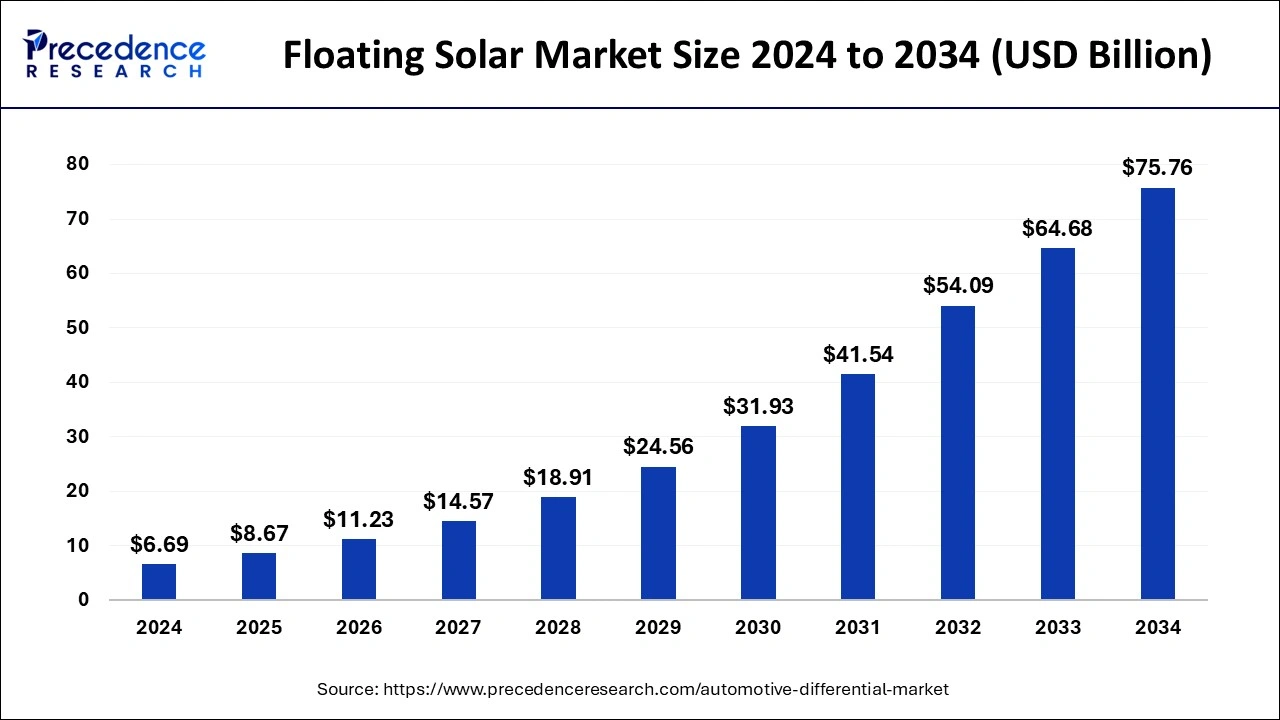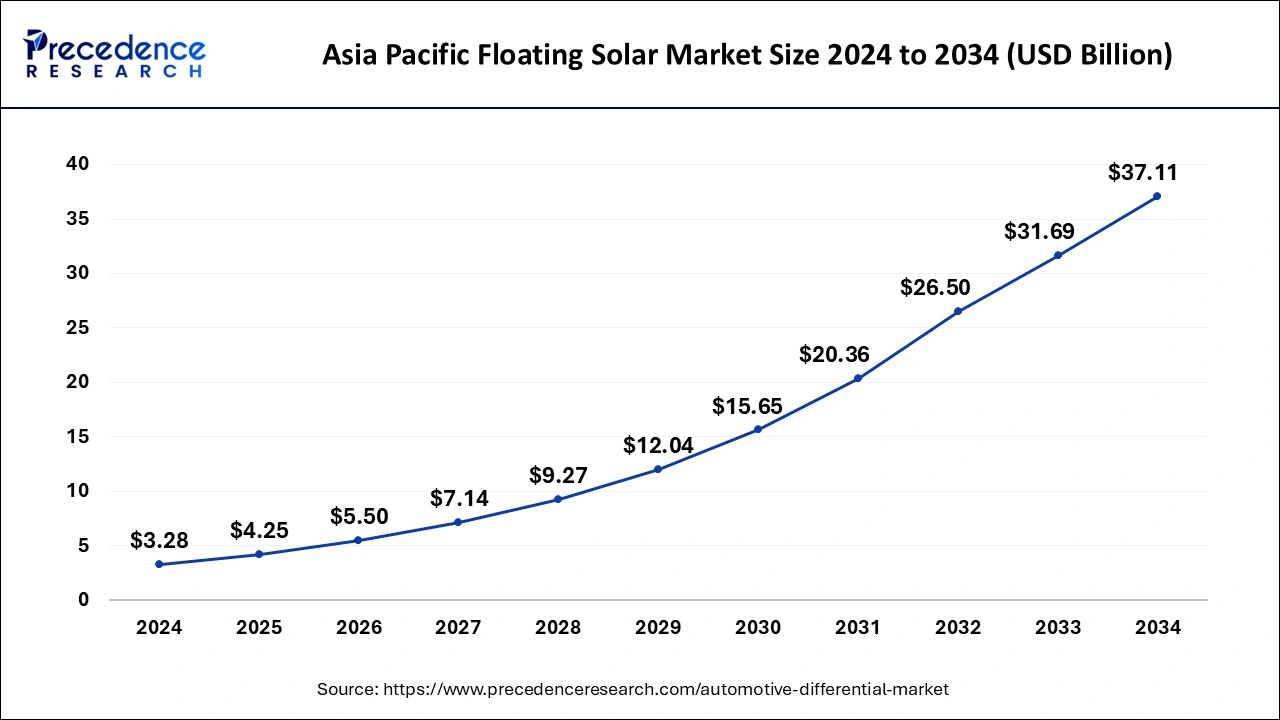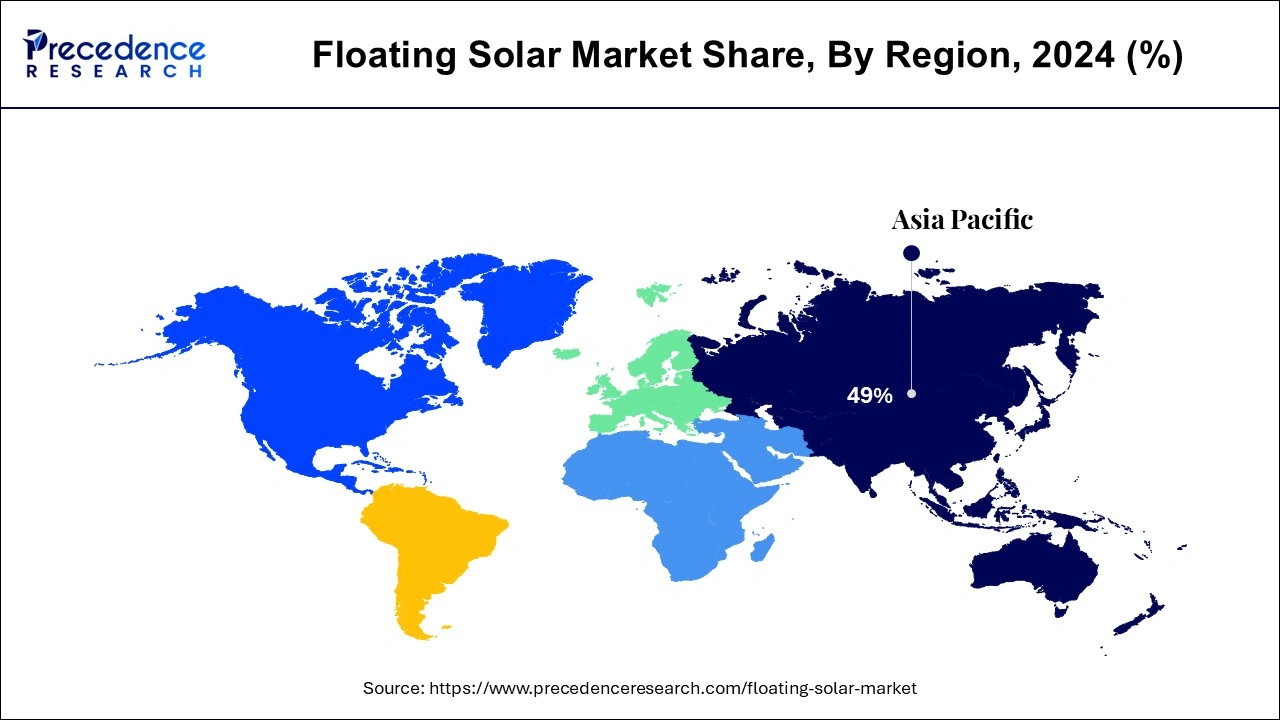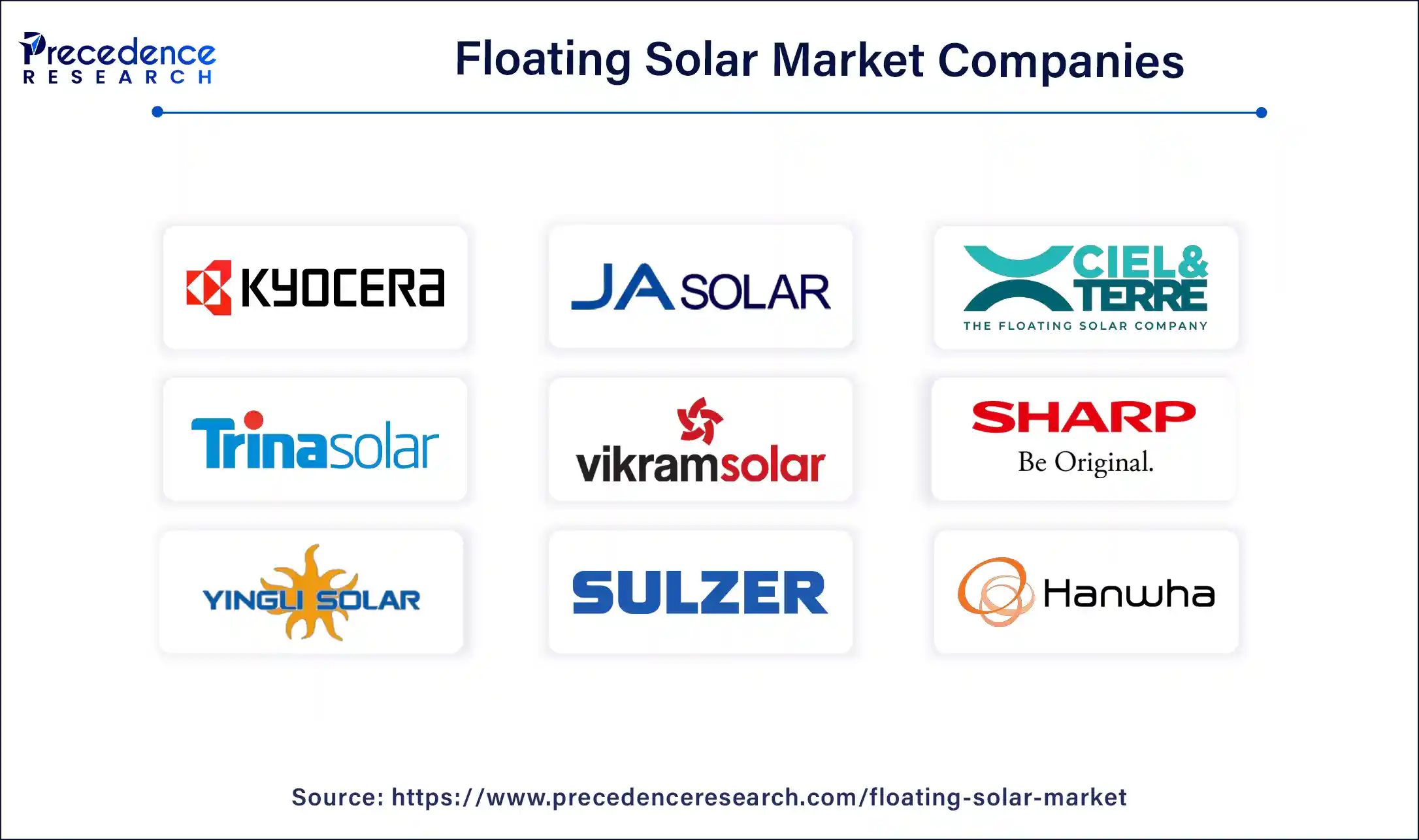December 2024
The global floating solar market size is calculated at USD 8.67 billion in 2025 and is forecasted to reach around USD 75.76 billion by 2034, accelerating at a CAGR of 27.47% from 2025 to 2034. The Asia Pacific floating solar market size surpassed USD 4.25 billion in 2025 and is expanding at a CAGR of 27.49% during the forecast period. The market sizing and forecasts are revenue-based (USD Million/Billion), with 2024 as the base year.
The global floating solar market size was accounted for USD 6.69 billion in 2024 and is anticipated to reach around USD 75.76 billion by 2034, growing at a CAGR of 27.47% from 2025 to 2034.

Artificial Intelligence (AI) has proven to be a game changer for the better in solar floating projects. Beyond pure efficiency, AI is changing the way use solar energy, making solar panels smarter, more flexible, and more environmentally friendly. AI in floating solar is falling into the realm of predictive analytics. Advanced algorithms analyze historical and real-time data, including weather patterns, sunlight exposure, and water. AI-powered monitoring systems increase the overall efficiency of floating solar projects. These systems continuously analyze data from sensors placed on the floating platform to identify potential problems or inefficiencies. AI also plays a key role in planning. By predicting equipment failure or wear and tear based on data patterns, AI can improve maintenance, reduce downtime, and increase operational efficiency, thereby spurring the development of the floating solar market.
The Asia Pacific floating solar market size was evaluated at USD 3.28 billion in 2024 and is predicted to be worth around USD 37.11 billion by 2034, rising at a CAGR of 27.49% from 2025 to 2034.

The Asia Pacific region experiences high levels of solar irradiance, making it conducive to solar energy generation. Floating solar panels on water bodies benefit from increased sunlight exposure, leading to higher energy yields compared to land-based solar installations. Several countries in the Asia Pacific have implemented supportive government initiatives and policies to promote renewable energy, including floating solar. Incentives, subsidies, and favorable regulations have encouraged the adoption of floating solar technologies.
Countries such as India, China, and Japan have embraced technological advancements in floating solar technology. Ongoing research and development initiatives, along with collaborations with international innovators, have led to improved efficiency and cost-effectiveness of floating solar installations.

China is observed to be one of the largest contributors to the market’s development in the upcoming period. China has embraced large-scale deployment of floating solar projects, leveraging its expansive water surfaces, including lakes, reservoirs, and ponds. This commitment to scale has propelled the country to the forefront of the global floating solar market. In April 2023, Chinese yard CIMC Raffles delivered China’s first ever semi-submersible photovoltaic power generation platform to CIMC Offshore Solar Technology.
North America is observed to witness the fastest rate of growth in the floating solar market during the forecast period. North America has witnessed a growing commitment to renewable energy sources, including solar power. Governments, businesses, and communities are increasingly recognizing the environmental and economic benefits of transitioning to cleaner energy alternatives. The region has seen innovative deployments of floating solar projects on various water bodies, including reservoirs, ponds, and lakes. These projects often involve collaborations between government entities, utilities, and private companies to maximize energy generation and address specific energy needs.
The solar panels attached to a structure that floats on a body of water, usually a reservoir or lake, are known as floating solar or floating photovoltaics. The fundamental benefit of floating photovoltaic plants is that they do not require any land, with the exception of the small areas required for the electric cabinet and grid connections. Their cost is equivalent to that of land-based plants, but they offer a smart option to avoid using up the land.
The use of floating solar panels has been highlighted as a viable and cost-effective alternative to land-based photovoltaic systems. It's a novel way to generate solar energy by utilizing the available water surface on dams, reservoirs, and other bodies of water. Solar panels that float on water, such as irrigation ponds, reservoirs, lakes, canals, and the ocean, are known as floating solar panels.
The companies in the floating solar industry are optimistic about the expansion of large-scale projects all around the world. They're putting more emphasis on utility-scale floating solar plants, which will help to reduce fossil fuel imports in various parts of the world while saving countries money in foreign currencies.
| Report Coverage | Details |
| Market Size by 2034 | USD 75.76 Billion |
| Market Size in 2025 | USD 8.67 Billion |
| Growth Rate from 2025 to 2034 | CAGR of 27.47% |
| Largest Market | Asia Pacific |
| Bae Year | 2024 |
| Forecast Period | 2025 to 2034 |
| Segments Covered | Capacity, Type, Geography |
| Regions Covered | North America, Europe, Asia-Pacific, Latin America, and Middle East & Africa |
The stationary floating panels segment held the dominating share of the market in 2024. Stationary floating solar panels are often considered more cost-effective to install and maintain compared to other floating solar technologies. Their simpler design and fixed structure can result in lower upfront costs and reduced maintenance requirements. Stationary floating panels are relatively easier to install and require less complex engineering compared to some other floating solar solutions, such as tracking systems. This ease of installation can make them a preferred choice for project developers seeking efficient deployment.
The 5 MW-50 MW segment held the significant share of the floating solar market in 2024; the segment is observed to sustain the position throughout the forecast period. Floating solar projects within the 5 MW to 50 MW range are often considered optimal in terms of size. They strike a balance between being large enough to benefit from economies of scale and small enough to efficiently manage and deploy. This size range allows for substantial electricity generation without facing some of the challenges associated with extremely large projects.
Moreover, the feasibility, grid integration and cost-effectiveness of the solar projects that hold the capacity of 5 MW to 50 MW propel the overall growth of the segment. Floating solar projects in the 5 MW to 50 MW range can be designed to have a positive environmental impact without causing significant disruption to aquatic ecosystems.
The on-grid segment held the largest share of the floating solar market in 2024. On-grid floating solar systems are directly connected to the existing electricity grid. This integration allows for a seamless supply of solar-generated electricity to the grid, contributing to the overall energy supply. Utilities and energy providers find on-grid connectivity more convenient for managing and distributing solar power efficiently.

By Capacity
By Type
By Connectivity
By Geography
For inquiries regarding discounts, bulk purchases, or customization requests, please contact us at sales@precedenceresearch.com
No cookie-cutter, only authentic analysis – take the 1st step to become a Precedence Research client
December 2024
September 2024
October 2024
August 2024